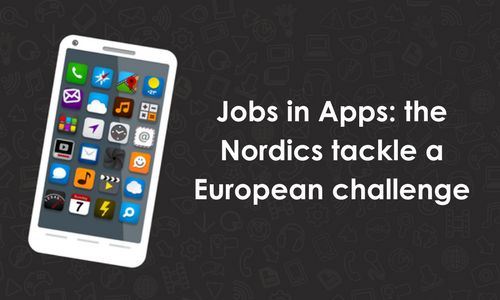After a successful launch at the IT University of Copenhagen in June, Copenhagen Economics brought to Brussels one of its latest studies, co-commissioned by the Developers Alliance: “Jobs in Apps: Mobile Economy in the Nordics. A Catalyst for Economic Growth.”
On 3 October, the research was discussed by key decision makers and industry leaders during a high-level roundtable. Introductory remarks were delivered by Åsa Webber, Ambassador of Sweden to the EU, and were followed by short presentations from Google, Copenhagen Economics and Developers Alliance. Participants discussed on how to empower European app developers and deliver maximum benefit from app entrepreneurship throughout Europe, based on the lessons from Nordic successes and challenges, highlighted by the Copenhagen Economics research. The study found that the app economy is a valuable source of jobs and growth in the Nordics, creating, 145,500 jobs in those countries, and has the potential to double that number by 2021. Such numbers give the Nordic countries a frontrunner position in Europe but also in the global app economy.
App entrepreneurship and the related business impacts are not a prerogative of Nordic countries alone. The app economy presents a potential engine of growth for all European economies. However, the roundtable addressed concerns for the app economy’s long term growth, such as regulatory measures increasing fragmentation and hurting developers that can now build apps that run seamlessly across thousands of different devices.
The mobile app ecosystem is a very competitive and thriving one. Various studies have recorded a tremendous increase in the number of smartphone users who now amounts to over 2 billion globally, and, consequently, in the number of apps that consumers use on their phones. A recent study published by AppAnnie found that by the end of July 2017, the iOS App Store and Google Play had more than 2 million and more than 3.5 million apps available, respectively. During the month of July 2017, roughly 50,000 new apps launched on the iOS App Store and over 150,000 were added to Google Play.
The revenue predictions are also impressive: according to AppAnnie, worldwide mobile app stores and in-app advertising combined spend will grow to exceed $340 billion in 2021. This kind of economic activity is made possible by the fact that app developers can scale globally from the start and can efficiently harbour and recruit top talents both amongst engineers and developers as well as supporting roles like marketing, HR, and digital business experts.
Building for scale is enabled by platforms, like Android for example, that give developers a big advantage by connecting them directly to a market of 2 billion active devices. But it wasn’t always that easy. The mobile ecosystem was fragmented before 2012. Android existed, but many phone manufacturers were heavily customising their platform, forcing developers to build different apps for each platform, at great cost. Android solved this issue, encouraging compatibility across devices.
Given the importance of creating a more enabling regulatory environment, with the biggest policy initiative being the Digital Single Market Strategy (DSM), policy makers need to focus on avoiding restrictive initiatives on the market that could cause fragmentation and lack of compatibility across devices, which could hamper developers easy access to the global market. Additionally, they need to commit to seriously address the gap in the skills base.
Conducive policies can and should create the right conditions for a healthy and sustainable mobile ecosystem and help app entrepreneurs win the global race. Thoughtful exchanges between app entrepreneurs, industry representatives, and elected leaders, like the Copenhagen Economics roundtable, will help guide policymakers toward decisions that benefit all stakeholders and consumers. The Alliance is committed to representing software developers in these discussions and encouraging the creation of a real European Digital Single Market.
The summary of the topics discussed during the roundtable is available here.




